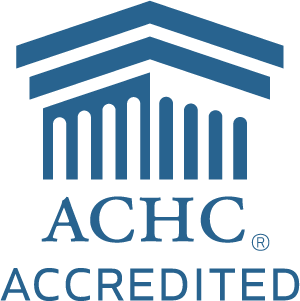As we grow older, our bodies change in many ways, affecting the function of different organs and systems. Vision and hearing are two sensory processes that can be affected by the aging process. Home healthcare providers can collaborate with patients and their families to develop and implement interventions and routines that may help promote healthy ears and eyes in seniors. Taking steps to optimize an elderly patient’s visual and auditory abilities can prevent falls and other injuries and improve their quality of life.
 Elderly patients are at a higher risk of developing AMD (Age-Related Macular Degeneration), Diabetic Retinopathy, Glaucoma, Dry Eyes, Cataracts, Low Vision, or other eye-related conditions that interfere with the ability to see well. Often, there are few symptoms or warning signs, so regular checkups with an ophthalmologist are integral to managing eye health as seniors age. Medications can also have side effects that alter vision. Conditions like Diabetes and High Blood Pressure can also impact the eyes.
Elderly patients are at a higher risk of developing AMD (Age-Related Macular Degeneration), Diabetic Retinopathy, Glaucoma, Dry Eyes, Cataracts, Low Vision, or other eye-related conditions that interfere with the ability to see well. Often, there are few symptoms or warning signs, so regular checkups with an ophthalmologist are integral to managing eye health as seniors age. Medications can also have side effects that alter vision. Conditions like Diabetes and High Blood Pressure can also impact the eyes.
If a senior patient has a sudden loss of, or change in, vision, sees floaters or web-like spots, or has eye pain, double vision, or red, swollen eyelids, this may indicate a more emergent eye condition requiring urgent attention. Contact their physician immediately.
Many medical and environmental interventions can reduce the impacts of vision changes on daily life for seniors. Home healthcare providers should monitor signs of vision impairment to ensure regular eye appointments are scheduled. Ophthalmologists may sometimes recommend using eye drops or sunglasses, and do regular vision checks to assess a senior patient. If a patient does have low vision or vision loss, it sometimes helps to use brightly colored tape to mark steps, inclines, or other fall risks. Bold print, motion lights, and labels in large fonts can help as well.
Seniors may also experience changes in their hearing, and homecare staff can help minimize the effects of changing auditory function in seniors with some simple ear care precautions. Hearing loss can present with various symptoms ranging from total hearing loss to less noticeable changes such as difficulty with hearing particular sounds. Seniors may also experience tinnitus, which is a ringing in the ears. All of these conditions can lead to difficulties with communication and safety, such as not hearing an alarm or alert siren.
Home health care providers can help maintain ear health in their patients by taking note of any changes in the senior’s hearing abilities, such as noticing if they are turning the volume up very high or not responding to conversation attempts. Keeping medical visits ensures patient’s hearing is assessed regularly. Maintenance like regularly cleaning the ears can prevent the buildup of wax or ear infections. Cotton swabs should never be inserted into the ear canal. Sometimes, seniors will develop a blockage in their ears from wax buildup. This should always be addressed by a medical professional to prevent further injury. Any sort of drainage from the ear is also not normal and requires medical attention. Ear pain can sometimes originate from the jaw, teeth, or neck. Elderly patients may also need reminders to wear ear protection at loud events or while using a lawn mower.
By implementing just a few simple routines, like checking eyes and ears, keeping regular appointments, and informally assessing a senior’s vision and hearing, home healthcare providers can prevent more serious conditions or complications. Further, regular checkups ensure glasses or contact prescriptions are adjusted and hearing aids or other therapeutic interventions can be addressed.
Allcare Home Health Agency, Inc. offers quality in-home assistance in the Raleigh/Durham area. Call (919) 301-0236 to schedule an assessment with one of our experienced RNs.
Aging and Your Eyes | National Institute on Aging (nih.gov)
Ear Care: Cleaning, Harm Prevention, Hearing Loss Symptoms (clevelandclinic.org)
Hearing Loss: A Common Problem for Older Adults | National Institute on Aging (nih.gov)

